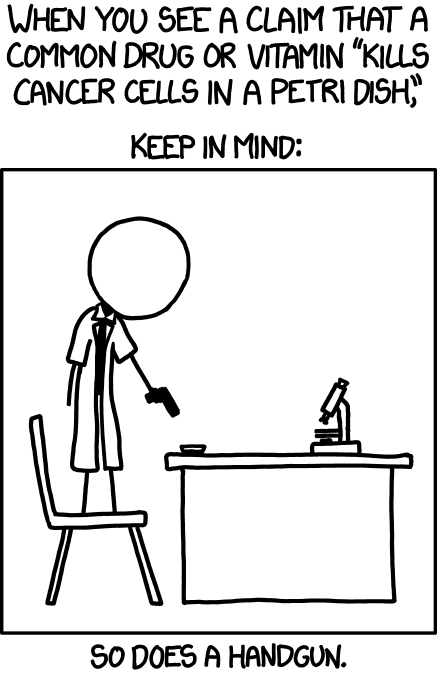In this study, the scientists simulated the process of spaced learning by examining two types of non-brain human cells — one from nerve tissue and one from kidney tissue — in a laboratory setting.
These cells were exposed to varying patterns of chemical signals, akin to the exposure of brain cells to neurotransmitter patterns when we learn new information.
The intriguing part? These non-brain cells also switched on a “memory gene” – the same gene that brain cells activate when they detect information patterns and reorganize their connections to form memories.
Memory is stored in the balls
Just to recap, sperm, pee, microplastics, and memories are stored in the balls? Am I missing anything? I can’t remember. Maybe my balls are too full of microplastics to recall.
Data.

I’m sure you could fit a few dollars in loose change in there to.
I keep cement in mine
Mine are filled with brass
Live bees here
Yukon gold potatoes.
You forgot about the wolves.
i forgot i put those there to control the deer population
The Soul is also stored in the balls.
Do you think that’s why we often tell god that we’re cumming?
Urine is not stored in the balls. I’m a doctor you can trust me on this
Even if you weren’t a doctor I’d agree with you. I was taught it’s stored in the bladder in ninth grade. Pretty sure that continues throughout your adult life. Lol
I thought you were referencing the conversation on Reddit or Twitter or something where someone had said “I’m a doctor, pee is definitely not stored in the balls” and then a really long argument ensued where the dude was pretty adamant that pee is stored in the balls. I just wanted to be the Dr
If you’re a doctor, then I’m a nun :)
deleted by creator
And when you fuck someone, you’re giving them your memories.
Vaginas remember the bad balls.
And if they swallow a load….
I think you may have just figured out alzheimers. You can’t go nutting away all of your memories.
Still better that “pee is stored in the brain”
Well some species do potentially have “genetic memories” so maybe some stuff actually could be
😆
in a laboratory setting.

Technically, a handgun also kills cancer in vivo. The problem is the cost to the host body.
Okay but what you’re saying is if I hired a good enough marksman to shoot the cancer out of my body without killing me then that’s a good thing right?
I mean, that’s basically what we do with gamma radiation and chemotherapy, just a little bit more ballistic, right?
Exactly! The only difference is that those use very tiny bullets.
Chemo only applies if it’s doped with a radionuclide, otherwise it’s just regular poison.
Do we need to format our kidneys before becoming a donor now?
Maybe. There are numerous reports of people having changes in personality after organ transplants.
Personality changes following heart transplantation: The role of cellular memory https://pubmed.ncbi.nlm.nih.gov/31739081/
https://www.sciencealert.com/eerie-personality-changes-sometimes-happen-after-organ-transplants
Damn, that’s interesting!
To be fair, I think anyone going through something as traumatic as basically being put into stasis and having their heart cut out and and then having one reattached would change a bit simply because of the process.
I mean, you don’t keep stepping on Lego bricks barefoot after you’ve done so, and we expect people who have had a heart ripped out and then another one reinserted to act the same?..
Many stories like this from fecal exchanges (trans-poo-sions)
Yes, that is also true. Many things make up the mind, and changing a major input, e.g. the microbiota that make a particular mix of short chain fatty acids and other neuro effective compounds, is going to change the cognitive outputs.
You really should affix the possible reasoning to your comment up the chain
changing a major input, e.g. the microbiota that make a particular mix of short chain fatty acids and other neuro effective compounds, is going to change the cognitive outputs.
This post is wildly running into speculation and I fear several users are taking the wrong implications that “conscious memory” is scientifically being validated as stored in the bodies several organs.
Its not the same memory as your brain. your life story is not in your non nerve cells. they have memory the same as yeast has memory but everyone is aware of how we have muscle memory in reptitive tasks.
I think muscle memory is just a phrase, but the training that makes and embed the “muscle memory” is essentially nural
yeah sorry I still feel that is neural just not all the way to the brain. I guess what I was trying to say if the article is not that cells hold your memory but that they hold their type of memories is a similar way.
Not to be a debbie downer here, but it’s important to keep in mind that unless expressly stated otherwise, so-called discoveries that are only published in out-of-the-way (ie. not respected scientific journals) have usually not been peer reviewed or had their results replicated, which is the entire point of the scientific method.
Here’s the paper.
Awesome. Thanks!
Its interestng, but kidney cells are not exposed to patterns of neurotransmiters like nerve cells are. Cells can be reprogramed to be stem cells as well with the right pattern od signals but that does not mean that it really happens in the body.
fascinating, this concept is a core to the theravadan buddhist practice of vipassana meditation, which is supposed to be what the buddha himself actually taught in his wandering classroom. I always took that bit with a grain of salt assuming it was just an old misunderstanding of what’s going on but the kind of non-thought memories appears to be exactly what is described.
it’s called Vasana and it’s said to be like ‘perfume lingering in cloth’, the residual karma from our actions that shapes our future and influences automatic actions and preferences. Trauma is said to be stored in the body as well as Sankhara.
I have always viewed vipassana as mental martial arts more than religion, and brushed off all the reincarnation and other inexplicable stuff. fascinating to hear scientists confirming what philosophers came up with thousands of years ago.
Its like the blockchain for you body.
I am become nft
Identifier of ownership
Isn’t the title misleading? A cell switching on the same gen neurons use to connect, if exposed to substance used to transmit information, doesn’t mean it stores or transmits any memories. It seems it doesn’t even do anything more, like forming dendrites or “answering” chemically.
Guess that’s just a side-effect of how the gen is exposed.
It’s more than that. People who have had heart transplants can inherit memories and personality traits from the donor. Cells remember more than they let on and can pass these memories to the recipient.
See this study. I think it’s safe to say we have some empirical evidence for this. In the linked study, there’s a kid who received a heart from another kid who died trying to retrieve a power ranger and somehow the donor knew that without anyone telling him. Another kid received a heart from a kid who drowned and he became afraid of water.
If I read the cited sources and they turn out to be a bunch of untested hypotheses based on poorly conducted studies… I’ll be mad.
Just skimming through it makes a bad first impression.
…I’m not even trying to be derisive. I’m just really angry at how much “there’s a study” has become “there’s proof”. And I shouldn’t even be mad because communicating that difference should be the authors’ job.
If you value your time, don’t read any further because I’m just going to vent a little:
So I lack any formal education (apart from ficking school). The best thing I can say about myself is that I can hold and mostly understand a conversation with people who are actually educated in their field.
But some studies are bad. Like bad-bad. So bad that I think, most people who can read should be able to recognize their flaws if they actually read them.
For example:
I read a study a while back about genetic (as opposed to learned) prepositions of monkeys in relation to their biological sex and preference for toys.
The methodology was bad, but here’s the shittiest part imo: At the end of the study, the researchers found that of the 130 or so monkeys, only about half showed any preference for any kind toy. So the researchers excluded the unbiased monkeys from the test. Of the remaining monkeys, still only the males showed any preference for the “male” toys. So the females were also excluded. In the end, only 30 monkeys actually counted, because they showed the hypothesized difference in their preferences. And even those only showed a delta of 10-30% in the time they spent with the toys.
The study should have concluded that most monkeys don’t give a shit if a toy has wheels (like a shopping cart, which apparently makes it a “male” toy) or if it’s soft, like a plush (which is “female” because boys would never touch a plushy, of course).
Instead, they found that their hypothesis turned out to be correct, after disregarding anything that invalidated their hypothesis.
Where did I get this study from? From social media, of course. Where a bunch of meat heads “proved” that all women genetically want to be tradwives and trans people don’t exist or some shit.
Fuck everything about this.
Sounds like utter bullshit to be honest with you.
At the bottom of that article you linked:
“Research data for this article Data not available / No data was used for the research described in the article”I’m all for implications but I think a little higher level of standards should be practiced since this is c/science.
The title is “misleading” because they’re not talking about visual/conscious mind memory as you’re doing here.
These non-brain cells also switched on a “memory gene” – the same gene that brain cells activate when they detect information patterns and reorganize their connections to form memories… "it suggests that in the future, we will need to treat our body more like the brain — for example, consider what our pancreas remembers about the pattern of our past meals to maintain healthy levels of blood glucose or consider what a cancer cell remembers about the pattern of chemotherapy.”
Furthermore, you’ve jumped onto anecdotal evidence and have declared it Empirical with your linked study
A literature review was performed to explore accounts of personality changes following heart transplantation … Further research is recommended.
That level of evidence would mean anyone claiming body transfers, alien abductions, past lives memories, etc etc would all be empirical data we must now scientifically accept.
I don’t see how you’re linking the two studies with the implied “It’s more than that”. The original study from OP is declaring nothing about actual memories that we’re “consciously using” being stored in other parts of the body. It’s stating they believe cells have “memory mechanisms” to better function, like a processor getting it’s own memory cache (that data storage is used for it’s processing purpose and isn’t included with your harddrive access).
They are a little deceiving/misleading with the article as well,
The goal of the research was straightforward — to investigate if non-brain cells contribute to memory… They ingeniously engineered the non-brain cells to generate a glowing protein, which indicated whether the memory gene was active or dormant… Not only does this research on non-brain cells introduce fresh perspectives to study memory, but it also holds promise for potential health-related benefits.
They tested a gene by bombarding cells with chemical cocktails, showing the gene can be activated. It’s a giant leap to then say we have empirical data that we store memories throughout our bodies.
“The Body Keeps the Score”
There are many stories on how the receiver of a transplant has felt themselves being “changed”, sometimes in ways that would remind people of the donor.
MDPI is like the lowest quality slop journal. Like anything gets peer reviewed in that thing.
Is there an element of literality to the term “muscle memory”?
Yes, insofar as many reflexive actions, enervation and fiber recruitment thresholds respond to training, such that they “remember“ actions you have performed many times before. There are many clusters of nerves throughout the body called ganglia that are responsible for low-latency control of various functions that would entail too much delay when controlled entirely by the brain.
Generally, the minimum input-process-activation turnaround time of the brain is about 4 hz (240-250 ms) which is too slow for many applications of motor function. But the “co-processing” allowed by the extended nervous system enables the body to, with practice, execute far more rapid and complex action sequences in response to local stimuli. Some actions can be triggered and completed before a signal even makes it to the brain.
Generally, the minimum input-process-activation turnaround time of the brain is about 4 hz (240-250 ms) which is too slow for many motor functions. But the “co-processing” allowed by the extended nervous system enables the body to, with practice, execute far more rapid and complex action sequences in response to local stimuli. Some actions can even be triggered and completed before a signal makes it to the brain.
Thank you. For some reason it makes me happy to know that.
“Muscle memory” is real.
It seem like they’re just saying kidneys remember kidney stuff, pancreases just remember pancreas stuff, etc etc.
It’s not like your kidney remembers Aunt Jean has a mole on her nose.
There is another body of research that deals with a person’s behavior can be heavily influence by endocrine actions. Organs can affect current endocrine responses. So there is a suggestion here that your kidney may not remember the Aunt Jean has a mole, it may remember why it releases certain hormones which can effect how you behave.
Yeah, but if you get someone else’s kidney, it “remembers” how that body worked.
I dunno. We (both my wife and I) can and have had long conversations with my gut (when there’s a rumbly in my tumbly you can hear it across a crowded room) and my gut seems to remember shit. It also has a strange fascination with cheese.
That sounds like a fun life/wife.
I am a very lucky person, and she is. It’s kind of like when you have a conversation with your meowbox of an orange tabby.
Read something like that in an old science fiction novel.
Old man’s brain is placed in a young woman’s body. Her brain was destroyed but most of her memories live on in her body.
Robert Heinlein, I Will Fear No Evil
“Elderly billionaire Johann Sebastian Bach Smith is being kept alive through medical support and decides to have his brain transplanted into a new body. He advertises an offer of a million dollars for the donation of a body from a brain-dead patient. Smith omits to place any restriction on the sex of the donor, so when his beautiful young female secretary, Eunice Branca, is killed, her body is used—without his knowledge and to the distress of some of those around him.”
You can tell it’s a really old book because they talk about $1 million like it’s a lot of money.
I’d read that novel.
Old man hell bent on world domination, but really wants Johnny in math class to ask him to the dance on Friday.
"I Will Fear No Evil, " Robert Heinlein.
One of Iain M. Banks’ Culture novels has an exceptionally old character who is so exceptionally old that he’s had to turn most of his body into memory storage (sounds weird if you think in terms of computers) to keep remembering things. He stores his sexy memories in his balls.
Don’t remember that char, can you refresh my memory (I am fully aware of the irony given the topic under discussion)
He’s in Hydrogen Sonata. The mcguffin guy who everyone is trying to find and talk to because he’s the only person who’s old enough to remember some very important thing about the early days of the Culture.
Reminds me of the guy that got a heart transplant and took up smoking like the original owner of the heart and started dating the original owners ex.
Was that a fictional work or actual patient?
From memory it was an actual patient but I wasn’t easily able to find it from a quick search.
I’ll take your word for it, because nobody ever lied on the interwebs.
[jk, thnaks for the response]






















